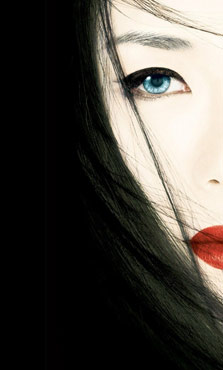 Perhaps I shouldn’t care that a man directed “Memoirs Of A Geisha”, that the book was written by a man, the score composed by a man, and produced mostly by men (one of them being Steven Spielberg). But something kept tugging at my enjoyment of this film, and it wasn’t until the bloke-heavy credits rolled that I knew what it was. The depiction of the life of the geishas, despite illustrating some of the hardships, inadvertently paints an amoral portrait dripping with affection and nostalgia. The audience is made to feel this is a beautiful world too delicate to survive the century. The film is bourgeois to the core; melodrama courses through the veins of this lush, lipsmacking period drama. Perhaps I shouldn’t care that a man directed “Memoirs Of A Geisha”, that the book was written by a man, the score composed by a man, and produced mostly by men (one of them being Steven Spielberg). But something kept tugging at my enjoyment of this film, and it wasn’t until the bloke-heavy credits rolled that I knew what it was. The depiction of the life of the geishas, despite illustrating some of the hardships, inadvertently paints an amoral portrait dripping with affection and nostalgia. The audience is made to feel this is a beautiful world too delicate to survive the century. The film is bourgeois to the core; melodrama courses through the veins of this lush, lipsmacking period drama.
Granted, the filmmakers are not obligated to didacticism. There’s no requirement to pass judgment on a film’s subject. But making a melodrama of the scenario means that any kind of real truth is null and void. This is disappointing, since a peek behind those ornately-decorated Japanese screens is the promise made on the movie poster.
What value, then, the “true” memoirs of a “real” geisha when her world is animated by stock story machinations and glossed over with the professional sheen of a fashion catalog? “Memoirs Of A Geisha” is a nicely painted puppet show and little else. What one could actually learn about geishas is swept away by what one is goaded into feeling by the twists and turns of the melodrama. Too male, too Hollywood. The profession of the geisha may or may not have died; the masculine fetish for it lives on.
As to the look of that fetish, “Geisha” is unquestionably a stunning film. Dion Beebe shot a magnificent looking movie which stands, ironically, as both an example of why Hollywood movies are capable of such unsurpassable visual brilliance and how that brilliance can betray the story. Colorful fabrics and richly textured interiors contrast with bottomless shadows and rain-slickened moonlit rooftops: so beautiful is it, in fact, that you can be sure someone’s pulling the kimono over your eyes.
Still, the actors (including many Chinese stars, presumably included to satisfy the money men eyeing international box office revenues) portray their characters with enough satisfying pluck to land the movie just this side of daytime-soap material. Ken Watanabe, as always, anchors the cast with his extraordinary stoicism and dignity. Up on the screen he is a marmoreal displacement who commands our full attention. He tends to be rather one-note as an actor, but with presence like that, who needs range? |